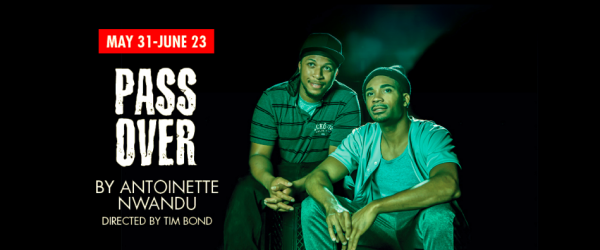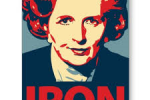The block traumatizes Young Black Men. Playwright Antoinette Nwandu and Director Tim Bond skillfully blur this into a block more like a cell block in prison than a city block one passes through between home and anywhere else one wants to go. Our protagonists in this show at ACT: Moses played by Treavor Lovelle, and Kitch, played by Preston Butler III, are prisoners on this block, kept there by their lack of means to get free. Getting free means achieving merit in the eyes of white-dominated economic, political, and social structures (formal education, vocation skills, middle-class speech patterns, etc.)
The “block” is the whole legacy structure that downgrades sharing and upgrades status—downgrades loving communities and upgrades hoarded personal wealth. The DNA of this imprisoning system that holds poor non-white people on their “blocks” is older than the “history” passed down through our Bibles and history lessons. Though never directly mentioned, their parents had been trapped on this same block, and their parents’ parents, on back to 1526 when the Spanish landed with African slaves in present-day South Carolina.
While finding our seats, we see Moses sleeping and Kitch keeping watch. These men are homeless. Lighting Designer Andrew D. Smith bathes this wordless open in a pale blue light. This reminded me of “the blues”—the musical narrative of suffering, dreaming, and defiance among poor African Americans that evolved in various places a couple of generations after the so-called end of slavery.
Everyone is on High Alert. In the play, both young black men dive and cover their heads when they hear gun shots. Police gun shots? Gang gun shots? Disagreement among individuals who know each other? How is one to know? Who can tell? It’s gun shots—duck and cover.
Moses and Kitch know like nobody’s business that no one leaves their block alive. So, they dream of leaving by playing a Pass Over Game—naming ten things they will enjoy when they have passed over to their utopian lives. This patter weaves in and out of their fluid relationship dynamics, such as, top-bottom status competition, friend-to-estranged tension, their motivation to pass over off the block versus their despair that it won’t ever “really” happen.
Seems familiar? if you are a student of theater it should. it’s the story spine lifted and “riffed” on by Nwandu from Samuel Beckett’s Waiting for Godot (Godot). The spine that Beckett is riffing on in Godot is the vaudeville act. These actors nail it. They got the patter and timing down pat. Their direction by Tim Bond uses the whole stage so that we see physically represented how close or distant they feel about each other moment-to-moment.
Kitch, more often spelled kitsch, is a German word meaning keyed to popular tastes rather than high-brow culture. Several of Moses and Kitch’s routines play off this high-brow culture idea. They fantasize about ordering caviar when they pass over the edge of the block, for example, until Kitch learns caviar are really fish eggs.
Moses dreams of ways to leave: Make Something of Themselves. Self-Actualize. Speak Like White People. They never look at their trauma so trauma runs their lives. Lovelle skillfully shows us the loops of conflicting feelings. Defiance spins to despair and despair sparks defiance.
Kitch weaves in matching Moses, but at times he despairs while Moses acts defiant; defiant when Moses despairs, and jumpstarts the dream of leaving again when both are spent.
Like in Godot, the introduction of more people disrupts the patterned patter. In this case it’s The White Man in two guises, both played by Avery Clark. As Mister, Clark has some, gosh, how can I say this, well, by golly, too many lines where he says “gosh” and “golly.” Not his doing, it’s in the script. This perhaps in balance to the runaway use of the n-word by Kitch and Moses when by themselves.
Mister offers them a full picnic basket of food intended for his mother to eat before it spoils. There’s a flash moment of connection as Moses samples the collard greens and pinto beans and proclaims they are the best he’s ever had. Mister used his mother’s recipe. Moses had early included this side dish in the Pass Over Game.
One of the tenser moments in the play is when Moses and Kitch seem ready to pounce on Mister should he say the n-word. Mister raises questions about who can, and cannot, say what. The play uses it 255 times.
This is a real off-stage issue because where and when do we discuss and agree to terms? The program posts a note “from the playwright” that the play is not an invitation to use the n-word in any context. It continues, “if you want to talk about the n-word, say ‘the n-word.’ Everyone will know what you mean!”
Clark returns several times as Ossifer, a white police office, or “the po-po” to Kitch and Moses. People of all backgrounds take up police work because they need to be the dominant human, especially during encounters while in uniform. Clark, as Ossifer, uses his demeanor, tone, and nightstick to enforce this dominance on the pair of friends, especially Moses, who he intuits is the “leader” that Kitch follows.
The pair did finally concoct a scheme that would help them pass over and off the block. To discover their discovery, go see the show.
Scenic design by Julia Hales Welch is very evocative of Godot, where there is a single tree in Godot and maybe a stone or tree stump, here we have a single street lamp, a square block of concrete with an attached chain (nice visual pun to being on the block), and an old tire. This is in the middle of a circular stage on a slightly raised platform, and around the platform there’s sand! These men are more than on a block, they may be on an island.
ACT posted this warning: Content Advisory: Contains loud gunshots and frequent and extreme profanity.
Pass Over by Antoinette Nwandu, directed by Tim Bond. Runtime: 90 minutes, no intermission. ACT: A Contemporary Theatre. Downtown, 700 Union St. Varied show dates & times. Tickets: ACT Tickets, 206.292.7676. Show closes Sun. June 23.




















